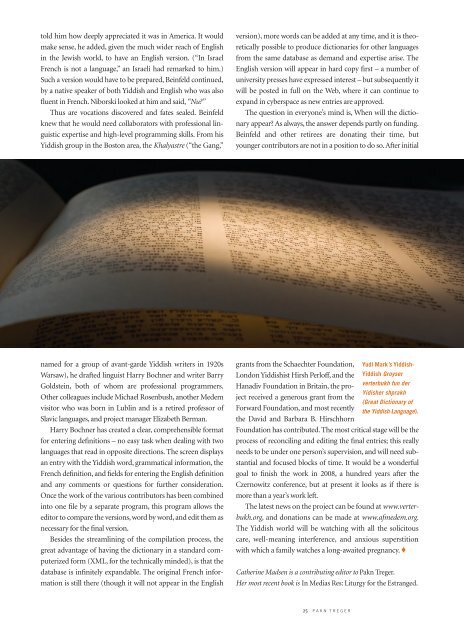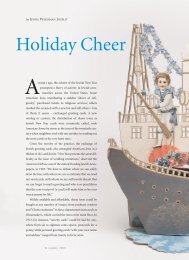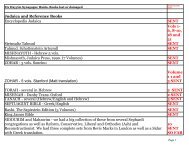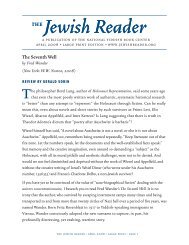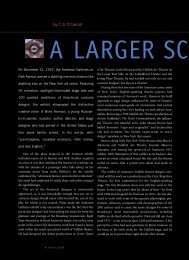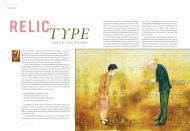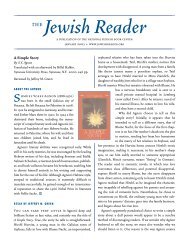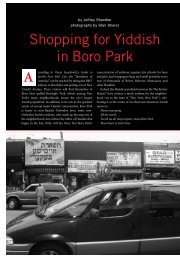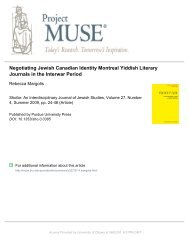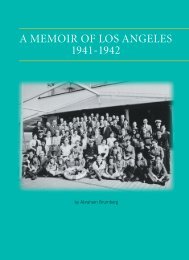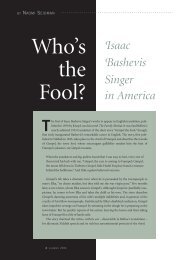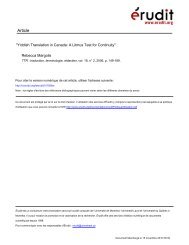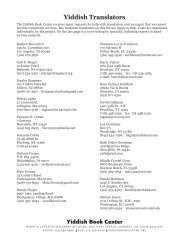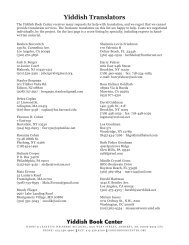by Catherine Madsen - Yiddish Book Center
by Catherine Madsen - Yiddish Book Center
by Catherine Madsen - Yiddish Book Center
You also want an ePaper? Increase the reach of your titles
YUMPU automatically turns print PDFs into web optimized ePapers that Google loves.
told him how deeply appreciated it was in America. It would<br />
make sense, he added, given the much wider reach of English<br />
in the Jewish world, to have an English version. (“In Israel<br />
French is not a language,” an Israeli had remarked to him.)<br />
Such a version would have to be prepared, Beinfeld continued,<br />
<strong>by</strong> a native speaker of both <strong>Yiddish</strong> and English who was also<br />
fluent in French. Niborski looked at him and said, “Nu?”<br />
Thus are vocations discovered and fates sealed. Beinfeld<br />
knew that he would need collaborators with professional linguistic<br />
expertise and high-level programming skills. From his<br />
<strong>Yiddish</strong> group in the Boston area, the Khalyastre (“the Gang,”<br />
version), more words can be added at any time, and it is theoretically<br />
possible to produce dictionaries for other languages<br />
from the same database as demand and expertise arise. The<br />
English version will appear in hard copy first – a number of<br />
university presses have expressed interest – but subsequently it<br />
will be posted in full on the Web, where it can continue to<br />
expand in cyberspace as new entries are approved.<br />
The question in everyone’s mind is, When will the dictionary<br />
appear? As always, the answer depends partly on funding.<br />
Beinfeld and other retirees are donating their time, but<br />
younger contributors are not in a position to do so. After initial<br />
named for a group of avant-garde <strong>Yiddish</strong> writers in 1920s<br />
Warsaw), he drafted linguist Harry Bochner and writer Barry<br />
Goldstein, both of whom are professional programmers.<br />
Other colleagues include Michael Rosenbush, another Medem<br />
visitor who was born in Lublin and is a retired professor of<br />
Slavic languages, and project manager Elizabeth Berman.<br />
Harry Bochner has created a clear, comprehensible format<br />
for entering definitions – no easy task when dealing with two<br />
languages that read in opposite directions. The screen displays<br />
an entry with the <strong>Yiddish</strong> word, grammatical information, the<br />
French definition, and fields for entering the English definition<br />
and any comments or questions for further consideration.<br />
Once the work of the various contributors has been combined<br />
into one file <strong>by</strong> a separate program, this program allows the<br />
editor to compare the versions, word <strong>by</strong> word, and edit them as<br />
necessary for the final version.<br />
Besides the streamlining of the compilation process, the<br />
great advantage of having the dictionary in a standard computerized<br />
form (XML, for the technically minded), is that the<br />
database is infinitely expandable. The original French information<br />
is still there (though it will not appear in the English<br />
grants from the Schaechter Foundation, Yudl Mark’s <strong>Yiddish</strong>-<br />
London <strong>Yiddish</strong>ist Hirsh Perloff, and the <strong>Yiddish</strong> Groyser<br />
Hanadiv Foundation in Britain, the project<br />
received a generous grant from the<br />
verterbukh fun der<br />
Yidisher shprakh<br />
(Great Dictionary of<br />
Forward Foundation, and most recently<br />
the <strong>Yiddish</strong> Language).<br />
the David and Barbara B. Hirschhorn<br />
Foundation has contributed. The most critical stage will be the<br />
process of reconciling and editing the final entries; this really<br />
needs to be under one person’s supervision, and will need substantial<br />
and focused blocks of time. It would be a wonderful<br />
goal to finish the work in 2008, a hundred years after the<br />
Czernowitz conference, but at present it looks as if there is<br />
more than a year’s work left.<br />
The latest news on the project can be found at www.verterbukh.org,<br />
and donations can be made at www.afmedem.org.<br />
The <strong>Yiddish</strong> world will be watching with all the solicitous<br />
care, well-meaning interference, and anxious superstition<br />
with which a family watches a long-awaited pregnancy. <br />
<strong>Catherine</strong> <strong>Madsen</strong> is a contributing editor to Pakn Treger.<br />
Her most recent book is In Medias Res: Liturgy for the Estranged.<br />
25 PAKN TREGER


